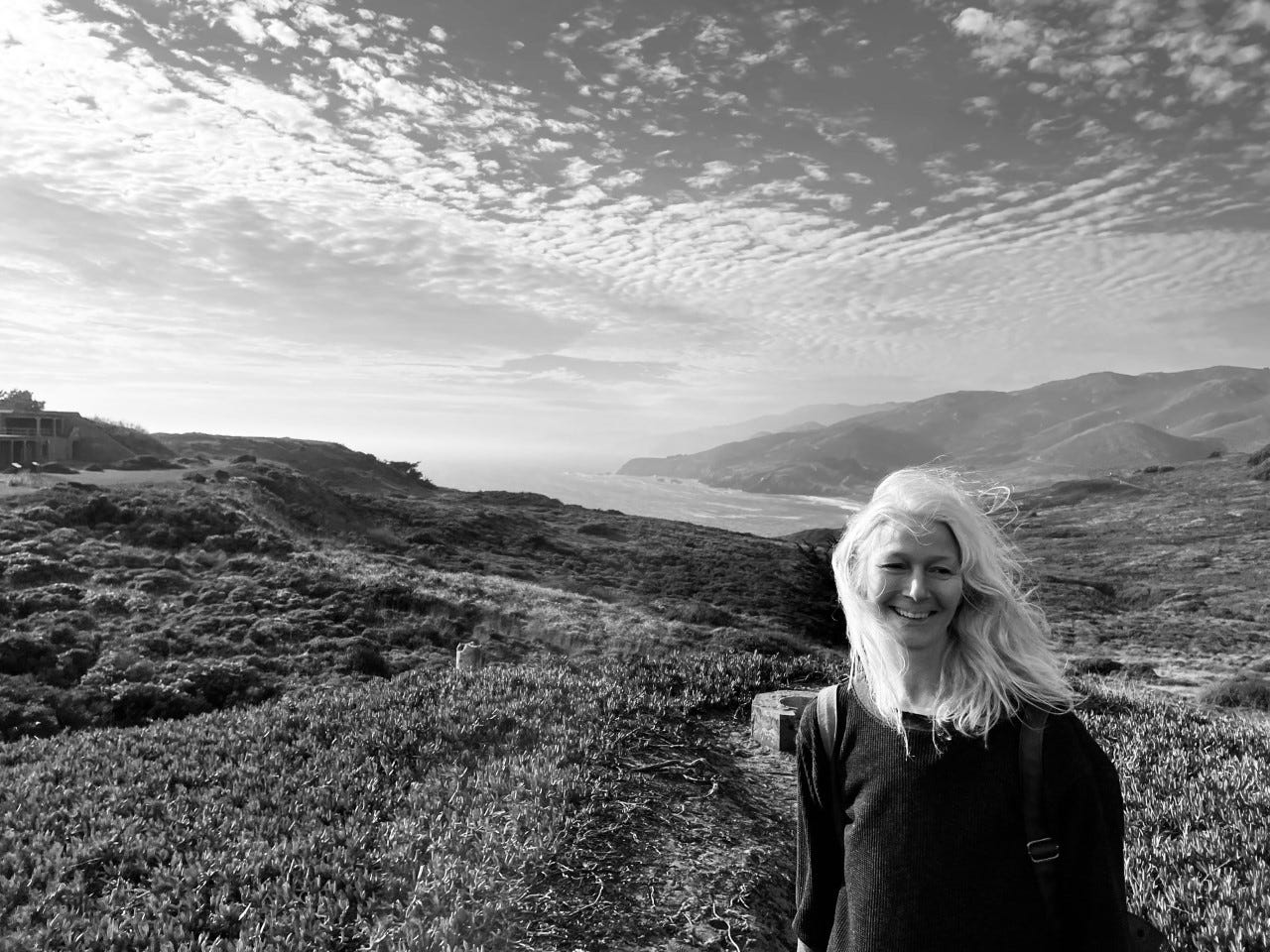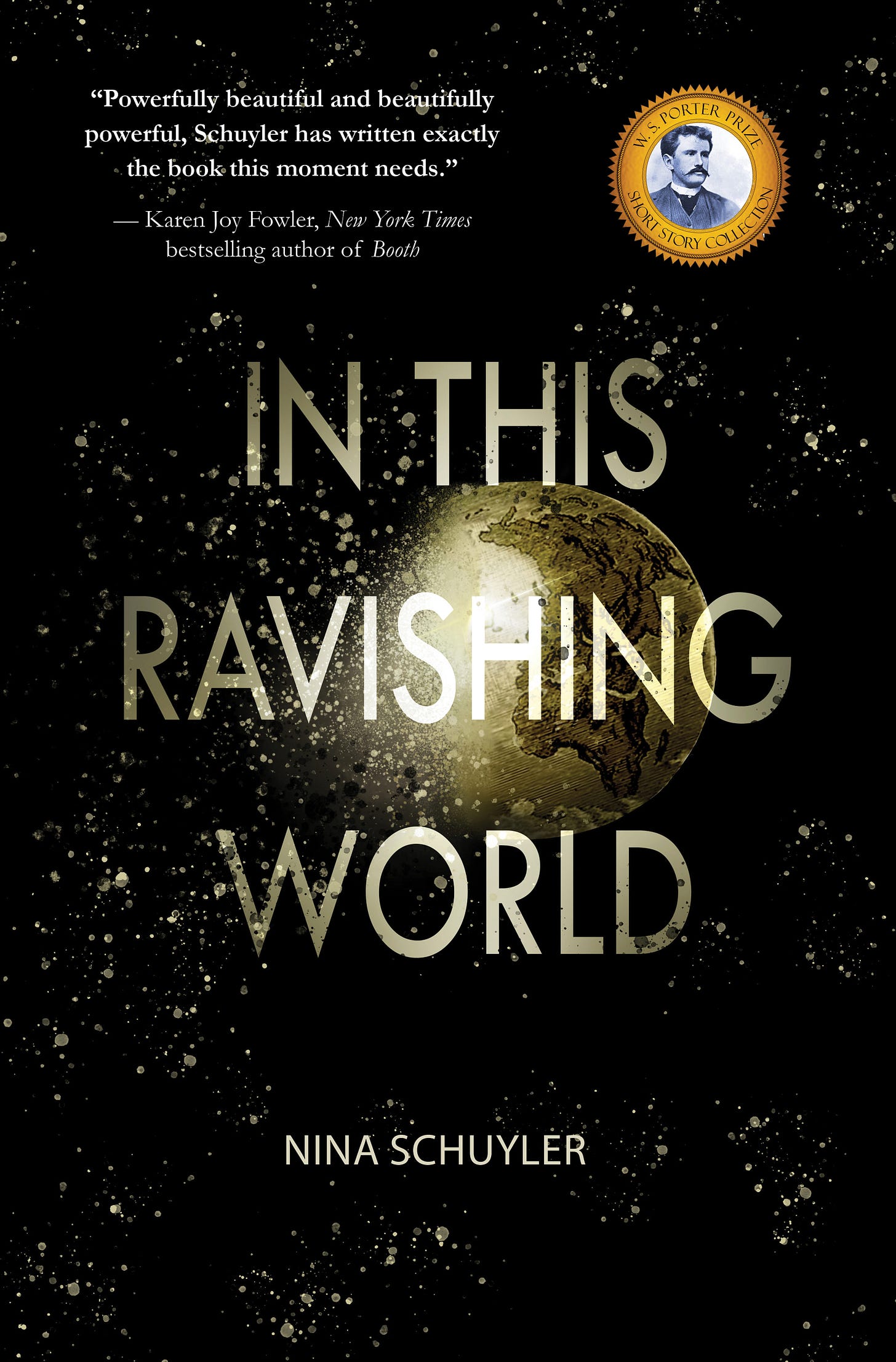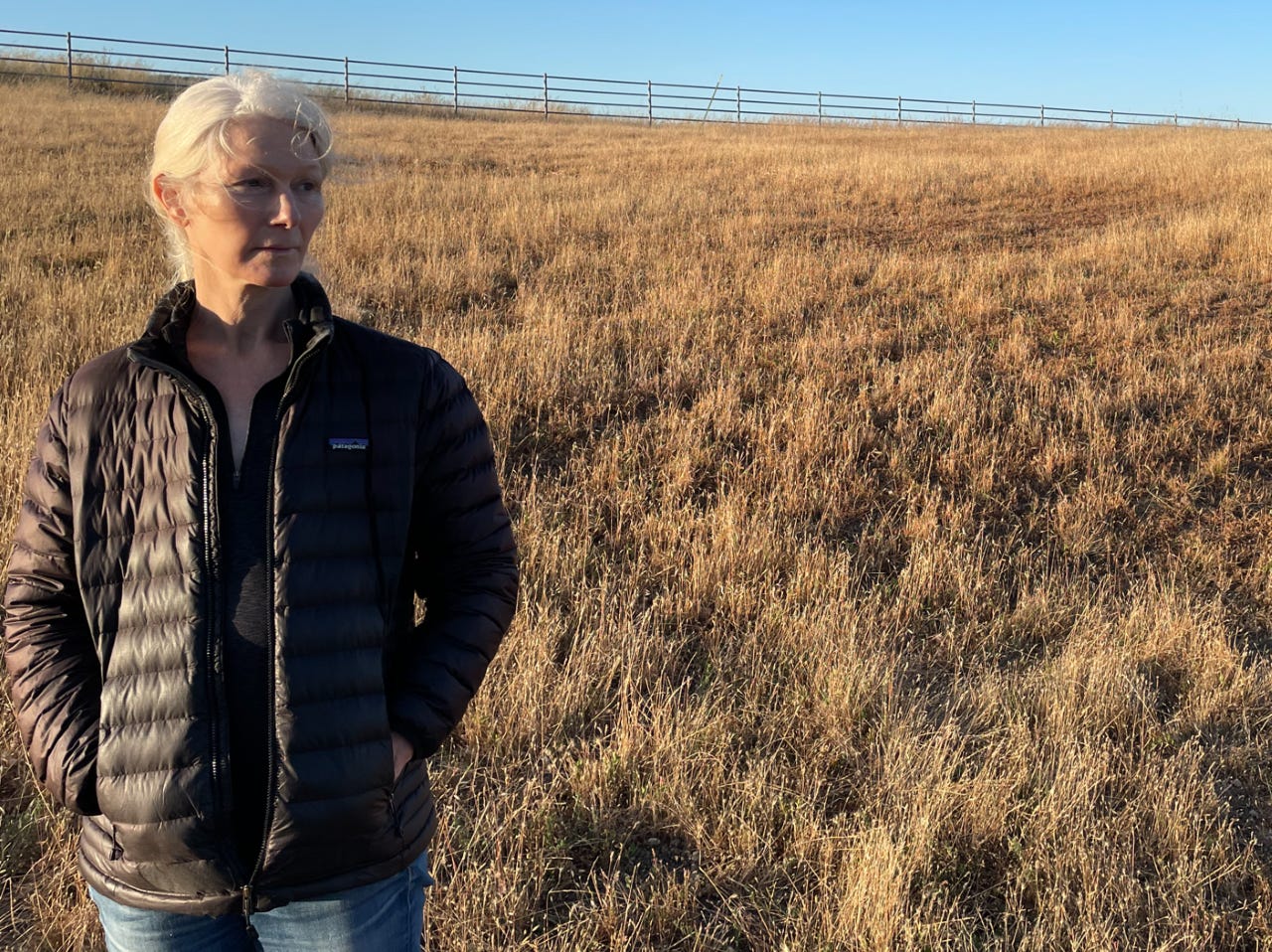Exploring hope on a changing planet
Author Nina Schuyler on giving nature voice through story
I’m delighted to share this interview with
. Nina is the author of In this Ravishing World, just released in early July, which was awarded the W.S. Porter Prize for Short Story Collections and The Prism Prize for Climate Literature. Nina teaches creative writing at Stanford Continuing Studies and elsewhere. Her Substack, , explores a stunning sentence from a published work, once per week. Paid subscribers gather with Nina once a month on Zoom and write a handful of stunning sentences, then read some of them and marvel at their beauty and originality.Through a series of short stories, In this Ravishing World covers an array of human behaviors, perspectives, and responses to the climate crisis. The book provided solace to me during an acutely difficult time–I really looked forward to nesting down with the stories at the end of each harrowing day to find out what the characters would do next, and discover how they were interconnected. Each story is woven so beautifully with the others, much like our own human and planetary tapestry.
I had a conversation with Nina about what prompted her to write this work of exploratory climate fiction now, how we orient ourselves toward hope and hopeful perspectives in a world that feels like it’s on fire all the time, and the role storytelling has to play in all of it. This interview expanded from that conversation.
Andrea Joy Adams: What do you think is the relationship between spirituality, nature, AI, and the human desire for control?
Nina Schuyler: I love the big stretch of this question! I’m going to respond by relying on the research and thinking I did for my collection, In This Ravishing World.
As I was writing the stories that swirl around the climate crisis, I became curious: How did we end up here? How did we end up with ecological destruction and collapse? The easy answer is the Industrial Revolution and the rapid emission of CO2. But what ideas and worldviews led to this moment? Here’s what I’ve pieced together so far.
In the collection, I included the voice of Nature. I anthropomorphized it, assigning it human characteristics, hoping to create a bridge via empathy between humans and the natural world. Anthropomorphism isn’t done in serious fiction. Anthropomorphizing is relegated to fantasy, science fiction, or speculative fiction, kept far from the pristine palace of serious fiction, which is under the umbrella of realism.
That umbrella emerged in the late 19th century in reaction to romanticism and, coincidentally, coincided with the Industrial Revolution. Realism literature aligns with a scientific framing of the world and stories are focused intensely on the drama and dynamics of humans. As Amitav Ghosh writes in his thought-provoking book, The Great Derangement: Climate Change and the Unthinkable, “It was exactly the period in which human activity was changing the earth’s atmosphere that the literary imagination became radically centered on the human.”
So our dominant paradigm through which we see reality is science. As my science friends remind me, anthropomorphizing is banned in science because of the fear it will bias the results. What is studied—insects, mammals, birds, ocean life—is turned into an object. This is the dominant paradigm. What we’ve done, in essence, is ban ourselves from the natural world and any kind of meaningful relationship with it. (No wonder we’re in an epidemic of loneliness.) The philosopher Martin Buber wrote in his 1923 book, I and Thou, that humans have two modes of existence. There’s the I-It relationship and the I-Thou. I’d say we’re primarily in an I-It relationship with the other-than-humans and with many humans. We look at the color or details of the tree, for instance--or its movement, or we categorize it by type. The tree is an “It,” an object that is separate from you, and the resulting relationship is a thin thread of utilitarianism. It’s anemic. Everything and everyone is turned into a resource. And here, now, we come to the question of spirituality.
The word “spirituality” clutches a bag full of historical associations. I’m going to refer to its etymology. It’s derived from the Old French, espirit, which comes from the Latin word spiritus—soul, vigor, breath. It means "animating or vital principle in man and animals.”
In the I-Thou relationship, other-than-humans are not turned into objects but experienced as alive beings. We are, in my view, in the realm of spirituality. The “I” is not separate from the other but deeply intertwined, so enmeshed that the “I” disappears.
Turning to artificial intelligence, which was what my novel, Afterword, was about, I see this new technology as the ultimate effort to know everything. Nietzsche declared God is dead. Well, the AI leaders are trying to revive God. They’ve made hyperbolic statements that AI will solve all intractable problems—education, health care, finance, energy, on and on. But at what cost? The tech leaders also talk about (not openly or often) universal basic income for all the people who will lose their jobs to AI.
A big concern is that as humans compete with AI and technological advances, we further become like technology itself, adopting its values of efficiency and productivity. Heidegger warned about this in his 1954 essay, “The Question Concerning Technology.” In it, he thought humanity could very well be flattened into these distinct values, shedding the fullness of being human--beings who care, love, who are compassionate, who feel and create art. Essentially he worried we’d operate at all times in the I-It realm and accept that we are an “It” and nothing more.
To complicate the AI picture, I have to add that AI may play a positive role in helping forge an I-Thou relationship with nature. (Nothing is all good or all bad.) In her fascinating book The Sounds of Life: How Digital Technology Is Bringing Us Closer to the Worlds of Animals and Plants, Karen Bakker discusses how scientists are using improved sensors and artificial intelligence technology to observe and decode how a wide range of species, including plants, are talking. For instance, they’ve found bats argue over food; they distinguish between genders when they communicate with one another; they have individual names or “signature calls.” Mother bats speak to their babies in an equivalent of “motherese.” So maybe anthropomorphism isn’t the right term at all. Maybe we’re in the realm of realism—we didn’t have the technology to listen and hear. Everything, it seems, is talking.
Something you said in our conversation really struck me: “Facts don’t matter anymore. We need stories.” I agree–more recounting of dire statistics is not going to rouse people to action, but relationships will. How do you think storytelling can shape the collective worldview?
I kept hearing that from my environmental friends: “Facts aren’t working. Write something. Do something.”
What well-crafted stories do so well is create experiences for the reader. It’s a completely different way of acquiring understanding and knowledge. It’s a felt knowledge, a bodily knowledge. If the story is written well, the reader engages with the fictional characters, who confirm the reader’s understanding of experience and change it by presenting what the reader can’t or hasn’t articulated. Well-drawn characters engender our sympathy, despite ourselves, by rendering experiences the reader didn’t imagine but can believe.
When writing a story, the building blocks are powerful nuggets called scenes. Scenes take place in a particular time and setting and are lush and ripe with sensory details. I think it was Flannery O’Connor who said if you include three or more sensory elements–sight, smell, taste, touch, and sound—the reader will experience the moment. These experiences speak directly to the reader’s body, and, unlike facts, what the body feels is an undeniable reality.

I’ve gathered from our conversation and from your writing that you see hope as an action, rather than a feeling. Would you agree? What words of wisdom would you offer to those who think there is nothing they can do that will make a difference?
Absolutely. To create the feeling of hope, you need action. Action leads to hope. I think there’s a real line of causation. There’s something about the human condition that when one has agency, one feels fitted to the world to change it, improve it. The world no longer feels alien or absurd. If you do nothing, if you worry and fret, despair settles into the bones and the blood. Despair corrals and captures the mind, sending it into a cage of apathy and deeper despair.
The incredibly astute Rebecca Solnit said the future is not yet written. If you look at the Intergovernmental Panel on Climate Change, a body of the United Nations, their reports always show four graphs that project possible futures. What we do now decides which trajectory we will be on in the future.
So what do we do? When asked this question, Bill McKibben always answers: Stop acting like an individual and join an organization. I asked my ecology friends for names of groups that are working on alternative energy because that’s what I’m interested in supporting.

I’m really excited about your next book project, which continues in the vein of giving a voice to nature. Can you tell us a little bit about your next book?
It’s still in that incubatory stage, and I’m protecting it so it can grow and flourish. I will say I’m excited about it, too, and I’ll say I’m still immersed in the world of nature and the other-than-human. Because I need to do something different for each big project, I’m in the realm of what’s called magical realism. Remember what the German art historian and critic Franz Roh (who coined the term) said of magical realism: it displays “calm admiration of the magic of being, of the discovery that things already have their own faces.” Magical realism is fascinated with a kind of magic that doesn't descend from outside of the objects but “hides and palpitates behind the objects themselves.”
In our conversation you said, “The thing that gives everything meaning is time: if we are finite, everything matters.” How do you take this lesson to heart in your life, and how do you think readers can use its wisdom?
Oh, to leave this ravishing planet! Heartbreaking! But with the limit on my time here, everything is excruciatingly poignant. I think by now I’ve sloughed off what doesn’t matter to me and spend a great deal of time with what does matter. Every day I write--it brings me such pleasure! I love teaching writing and sharing what I find with other writers, so I do a lot of that. I love guiding my children to become who they want to be. I have a very good friend who is now in assisted living, and I visit as often as I can. You see, my mother died early, and my husband’s parents died early. We’ve both stared at that beast for a long time, and it forces you to rid yourself of the delusion you have all the time in the world. You get on with it.
How do you cultivate hope/or, what brings you hope?
Here’s what’s happening at my book events and it’s utterly beautiful and fills me with hope. After I read and discuss the making of the book, the audience begins to talk: How can we cut back on plastics? In Australia, fast food places don’t provide plastic forks or cups. You bring your own. I ripped out my lawn and planted a pollinator garden. Now my neighbors are doing the same thing. How can we get out the vote to ensure we elect political leaders who will address climate change? I’ve cut back on meat consumption. I’m limiting my airplane travel. What kind of earth will exist for future generations? On and on, and the room fills with questions and responses, and slowly what felt like isolated people sitting on metal chairs becomes a gathering with a focus and something charged in the air.
This is what the climate scientists say needs to happen: we need to talk about it and share from the heart why it matters. As environmental journalist Sara Peach wrote, “Talk is the fertile field in which cultural change begins; in its absence it’s impossible for a group of people to solve a problem.”






Thank you for bringing this wonderful interview to us! I'm a bit over halfway through Nina's book and it delivers on everything she says here! The characters are engaging and real, flawed, passionate, grieving, and hopeful. Her last comment reminded me of something one of my former students said when we held a Town Hall for alumni to speak with current students. At the end, we asked them all the same question, how are you building hope? And Leah answered, "I think we shouldn't underestimate how powerful just having conversations with each other can be, because ideas can spread and that's how change happens. So if this could be the spark, I think that's a great thing."
A great interview, fantastic to be introduced to you both and your work. Looking forward to reading this book, love that you are giving the natural world her voice.
So many gems in this conversation. Totally agree on how essential collective climate conversations are , have participated in and facilitated many over last 15 years. The energy that comes out of honest sharing of feelings and ways to act in response is palpable and bonding. Definitely what keeps me going in climate space. .